Religious Organizations
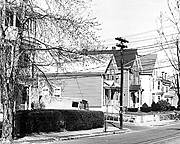
Neighborhoods
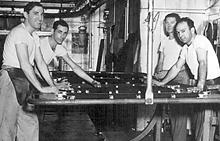
Workplaces
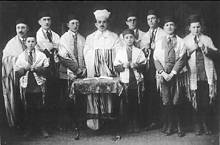
Worship
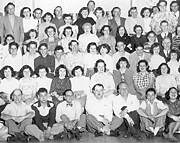
Community
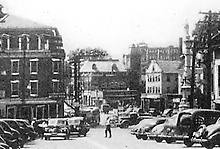
Downtown
The earliest religious services were conducted on Main Street at the corner of Mill Street; later, in the Red Men’s Hall on Foster Street. In 1909 Congregation Sons of Israel was organized and the present synagogue on Elliott Place was dedicated in 1913. Among the earliest officers were Samuel Rossen, Frank Hershenson, and Jacob Edelstein, the latter serving Secretary for about 40 years. President today is Allen S. Levy. In 1914, Congregation Anshe Sfard was established in the building which continues to be maintained today on Little’s Lane. The first president was Louis Ankeles and now, Saul Tanzer is its president. The Sephardic group, organized as Congregation Tifereth Israel, held services in the vestry of the two synagogues, later in their own synagogue, over the Peabody line in Salem and more recently in the former Nazarene Church building on Pierpont Street. The head of this congregation today is Joseph Gibeley.
The first spiritual leader to serve the entire Jewish community was Rev. Maurice Ordman who came to Peabody in 1920, and served until his death in 1938. Under his scholarly guidance, Friday evening services were initiated as well as adult classes in the study of the Talmud. In 1912, the community had its own Shochet, a ritual slaughterer, Rev. Mandel Gladstein. Thereafter there were Rabbis Chaim Essrog, Irving Perlman, Samuel Langer, Arthur Oles and Noah Goldstein. In 1920, Rev. Samuel Dandes came to Peabody and for many years was the Cantor and Torah reader at Congregation Anshe Sfard.
As the population increased great interest arose for the establishment of Conservative and Reform houses of worship since the old synagogues were maintained principally in the Orthodox tradition. In 1958 the Conservative Temple Ner Tamid was organized. Leon Steiff was the first president. Services were conducted at the Cy Tenney Hall in West Peabody, in the Anshe Sfard Synagogue, the Tifereth Israel Synagogue on Pierpont Street and then in May 1965, the Temple dedicated its own edifice on Lowell Street with Rabbi Ralph DeKoven. Today the Temple, with a membership of over 300, is under the presidency of Irving Babner and the spiritual leadership of Rabbi Abraham Morhaim.
At the same time, in 1958, the Reform Temple Beth Shalom was established. Edward Hoffman was its first president and Rabbi Richard Safran its first spiritual leader, followed by Rabbi Morris Kipper and now by Rabbi Howard B. Greenstein. Services were first conducted the Cy Tenney Hall, then at the St. Vasilios Recreational Center on Tremont Street, and the Hebrew Community Center until the Temple was built off of Lowell Street and dedicated in November, 1965. Its membership is about 175, and the president is Louis Doctor.
Hebrew School
As an integral part of the religious spirit of the people, a Hebrew School was established in 1912 under the sponsorship of Congregation Sons of Israel and the Auxiliary of the School. Prior to that, children were taught by laymen, such as Mr. Schwachman, in the building at the corner of Lowell and Chestnut Streets. With the opening of the Synagogue, the School began to flourish and continue in its growth, when it was moved into spacious quarters at the new Hebrew Community Center in 1939. The early teachers were Lock, Friedman, and Shapiro. In 1920, Rev. Samuel Dandes began to teach religious classes in his home and later conducted a school in the Anshe Sfard Synagogue as well as in the Sons of Israel Synagogue. In 1950, the Hebrew School obtained the services of Moshe Shiffman, an outstanding Jewish educator, and has been fortunate to have him as principal and teacher, for 19 years until his retirement this past June. For many of these years, he was ably assisted by his wife, Hilda. His successor is Rabbi C. Harold Krasnow who has opened the new School year several weeks ago. During the years, the School was guided by a School Committee and by the Ladies Auxiliary, later known as the Sisterhood of the Hebrew School. A few of the members of the Committee during the early years were Harry Mincovitz, Frank Hershenson, Sol D. Hershenson, Morris Isaacson Sydney Lippa, Samuel Goldberg, Harris Goldberg, and Julius Weisman. Norman Altshuler is now its president.
A school for the teaching of the Yiddish language was also established in the early 1920’s, called the Arbeiter Ring Schule, and sponsored by the local branch of the Workingmens’ Circle. It flourished for about 30 years. Today, in addition to the Peabody Hebrew School at the Community Center, both Temple Ner Tamid and Temple Beth Shalom conduct their own religious schools which are very well attended.
Civic Organizations
The common language and background of the early Jewish settlers created a need for civic and fraternal organizations. The Workingmen’s Circle local branch was established in 1907 and remained active until recent years. A local group of the Independent Order of B’rith Abraham was established in 1913 and remained active until 1930. In 1916, the Maple Hill Cemetery Association was organized and a burial ground on North Central Street was dedicated. The organizers included Samuel Goldberg, Samuel Rossen, M. Cohen and Charles B. Smidt. It continues to serve the Jewish community under the presidency of Julius Weisman. In 1913, in order to provide financial assistance to the new immigrants, the Popular Credit Union was incorporated among the first credit unions in the State by David Rosenfelt and others. Today, it continues to serve, with membership open to all people. The president is Edward Edelstein, The Ladies Auxiliary of the Peabody Hebrew School was a very active group from its inception in 1917. Among its organizers were Mrs. Max Korn, Mrs. Louis Karelitz, Mrs. Philip Weinblatt, Mrs. Frank Hershenson, and Mrs. Regina Strauss. The Ladies Auxiliary of Congregation Anshe Sfard was founded under the leadership of Mrs. David Herman, Mrs. Abraham Bazer and Mrs. Michael Shaktman. A number of charitable organizations were established and served local needs for many years. The largest of these groups was the Hebrew Ladies Aid Society, led by Mrs. Louis Glass and Mrs. Barnet Smidt.
Another was the Jewish Pioneer Women who for many years raised funds for the Labor movement in Palestine. More recently, local chapters of Hadassah, ORT, and B’nai B’rith Women were established and continue to function. In 1939 with the great need for aid to the Jewish people entering Israel, then Palestine, the United Jewish Appeal was first instituted in Peabody. From the 1930’s to the present annual campaigns have been conducted and considerable sums of money were raised. Among the first leaders were Max Korn, David Kirstein, Max Kirstein, David Rosenfelt, Barnet Smidt, and Louis Meyerson.
In October, 1939, a hope and dream of Jewish leaders in this City for many years was realized with the dedication of the Hebrew Community Center on Washington Street. It served, and continues to serve, the entire Jewish community. Almost every Jewish organization has made use of its facilities; and it is the home of the Peabody Hebrew School. The dedicated work of David Kirstein, Max Kirstein, Max Korn, Manahan P. Stone, the Ladies Auxiliary of the Hebrew School, and many others made the Center possible. The first president was Samuel Rafey who died before the building was dedicated. He was succeeded by Dr. Irving Winer. Other presidents were Elihu A. Hershenson, M. Irving Herbster, Bernard J. Alpers, and now the president is David Remis. Rabbi Chaim Essrog was the Center’s first Executive Director.
In 1949, the Jewish Men’s Club was organized, with Morris Pritzker as president, succeeding the Young Men’s Hebrew Association of earlier years, serving in a social, cultural, and civic capacity. One of its greatest contributions has been the creation and maintenance of scholarship funds awarded annually to graduates of Peabody High School. The administration of these scholarships has been under the continuous direction of Benjamin I. Dandes. The president now is Norman Altshuler.
Participation in Public Life
The first person of Jewish faith to be elected to public office in Peabody was Attorney Elihu A. Hershenson, as a member of the School Committee. In 1926 he was elected to the City Council and served two terms. He had served as city collector, had been elected a Trustee of the Peabody Institute, and in the administration of Mayor James E. McVann, was appointed city solicitor, from 1935 to 1938. Attorney George Ankeles was elected to the City Council in 1933 and from 1946 to 1951 was appointed City Solicitor by Mayor Leo F. McGrath. He is now legal counsel to the Peabody Redevelopment Authority. Attorney Abraham Ankeles was city collector during the administration of Mayor Joseph B. O’Keefe, and from 1956 to 1961 held the office of city solicitor, having been appointed by Mayor Philip C. O’Donnell. In September 1964, Abraham Ankeles was appointed Special Justice of the District Court of Peabody by Governor Endicott Peabody. The first Jewish woman in politics was Attorney Cynthia Fields who was elected to the School Committee and served from 1958 to 1962. Edward Bacherman was elected to the School Committee for the term of 1962-1966, and this year, Gilbert Rosenthal was elected by the Council and School Committee, to the School Committee to complete the term of a member who had resigned.
Attorney M. Irving Herbster held the office of city solicitor from 1962 to 1967, having been appointed by Mayor Edward T. Meaney. With the administration of the present Mayor, Nicholas Mavroules, came the appointment of Harry Sherr as the first ombudsman of the city, in the nature of an administrative assistant to the mayor.
The highest honor, in terms of national importance, given to a resident of Peabody was bestowed upon Atty. Arnold Ordman by President John F. Kennedy in 1963 when he was appointed General Counsel of the National Labor Relations Board in Washington. Again, in 1967 he was appointed to a second 4-year term by President Lyndon B. Johnson. Although born in New Hampshire, Arnold Ordman came to Peabody at the age of 8 and lived here for many years, graduating from Peabody High School. His father served as spiritual leader of the Jewish community.
The Jewish community, with all of Peabody, participated in the first World War by sending about 30 men into service and in World War II, about 150 men and about 10 women into the service of our country. Of these, seven men made the supreme sacrifice. They were: Sidney Arons, Harold Kirstein, Jacob Stahl, Morris Trabach, Abraham Verner, Ralph Yonis and Louis Wiseman. In 1939 Joseph Salloway, a veteran of World War I, was instrumental in organizing in Peabody, Post 220 of the National Jewish War Veterans, and serving as its first Commander. Open to veterans of all wars and their families, they maintain an interest in national policies as they relate to the Jewish people. With its Ladies Auxiliary, the Post serves the disabled veterans by frequent visits to various hospitals in the eastern part of the state. The present Commander is Sidney Gold.
